
by Deep Green Resistance News Service | Apr 11, 2018 | People of Color & Anti-racism
by Steve Biko
One of the most difficult things to do these days is to talk with authority on anything to do with African Culture. Somehow Africans are not expected to have any deep understanding of their own culture or even of themselves. Other people have become authorities on all aspects of the African life or to be more accurate on Bantu life. Thus we have the thickest of volumes on some of the strangest subjects – even “the feeding habits of the Urban Africans,” a publication by a fairly “liberal” group, Institute of Race Relations.
In my opinion, it is not necessary to talk with Africans about African culture. However, in the light of the above statements one realises that there is so much confusion sown, not only amongst casual non-African readers, but even amongst Africans themselves, that perhaps sincere attempt should be made emphasising the authentic cultural aspects of the African people by Africans themselves.
Since that unfortunate date – 1652 – we have been experiencing a process of acculturation. It is perhaps presumptuous to call it “acculturation” because this term implies a fusion of different cultures.
In our case this fusion has been extremely one-sided. The two major cultures that met and “fused” were the African Culture and the Anglo-Boer Culture.
Whereas the African culture was unsophisticated and simple, the Anglo-Boer culture had all the trappings of a colonialist culture and therefore was heavily equipped for conquest.
Where they could, they conquered by persuasion, using a highly exclusive religion that denounced all other Gods and demanded a strict code of behaviour with respect to clothing, education ritual and custom. Where it was impossible to convert, fire-arms were readily available and used to advantage. Hence the Anglo-Boer culture was the more powerful culture in almost all facets. This is where the African began to lose a grip on himself and his surroundings.
Thus in taking a look at cultural aspects of the African people one inevitably finds himself having to compare. This is primarily because of the contempt that the “superior” culture shows towards the indigenous culture. To justify its exploitative basis, the Anglo Boer culture has at all times been directed at bestowing an inferior status to all cultural aspects of the indigenous people.
I am against the belief that African culture is time-bound, the notion that with the conquest of the African all his culture was obliterated. I am also against the belief that when one talks of African culture one is necessarily talking of the pre-Van Riebeeck culture. Obviously the African has had to sustain severe blows and may have been battered nearly out of shape by the belligerent cultures it collided with, yet in essence even today, one can easily find the fundamental aspects of the pure African culture in the present day African. Hence in taking a look at African culture, I am going to refer as well to what I have termed the modern African culture.
One of the most fundamental aspect of our culture is the importance we attach to Man. Ours has always been a Man-centred society. Westerners have in many occasions been surprised at the capacity we have for talking to each other – not for the sake of arriving at a particular conclusion but merely to enjoy the communication for its own sake. Intimacy is a term not exclusive for particular friends but to a whole group of people who find themselves either through work or through residential requirements.
In fact, in the traditional African culture, there is no such thing as two friends. Conversation groups were more or less naturally boys whose job was to look after cattle periodically meeting at popular spots to engage in conversation about their cattle, girlfriends, parents, heroes, etc. All commonly shared their secrets, joys and woes. No one felt unnecessarily an intruder into someone else’s business. The curiosity manifested was welcome. It came out of a desire to share. This pattern one would find in all age groups. House visiting was always a feature of the elderly folk’s way of life. No reason was needed as a basis for visits. It was always part of our deep concern for each other.
These are things never done in the Westerner’s culture. A visitor to someone’s house, with the exception of friends, is always met with the question “what can I do for you?” This attitude to see people not as themselves but as agents for some particular function either to one’s disadvantage or advantage is foreign to us. We are not a suspicious race. We believe in the inherent goodness of man. We enjoy man for himself. We regard our living together not as an unfortunate mishap warranting endless competition among us but as a deliberate act of God to make us a community of brothers and sisters jointly involved in the quest for a composite answer to the varied problems of life. Hence in all we do we always place Man first and hence all our action is usually jointly community oriented action rather than the individualism which is the hallmark of the capitalist approach. We always refrain from using people as stepping stones. Instead we are prepared to have a much slower progress in an effort to make sure that all of us are marching to the same tune.
Nothing dramatises the eagerness of the African to communicate with each other more than their love for song and rhythm. Music in the African culture features in all emotional states. When we go to work, we share the burdens and pleasures of the work we are doing through music. This particular facet strangely enough has filtered through the present day. Tourists always watch with amazement the synchrony of music and action as African working at a road side use their picks and shovels with well-timed precision to the accompaniment of a background song. Battle songs were a feature of the long march to war in the olden days. Girls and boys never played any games without using music and rhythm as its basis. in other words with Africans, music and rhythm were a not luxuries but part and parcel of our way of communication. Any suffering we experienced was made much more real by song and rhythm. There is no doubt that the so called “Negro spirituals” sung by Black slaves in the States as they toiled under oppression were indicative of their African heritage…
Attitudes of Africans to property again show just how un-individualistic the African is. As everybody here knows, Africans always believe in having many villages with a controllable number of people in each rather than the reverse. This obviously was a requirement to suit the needs of a community-based and man-centred society. Hence most things where jointly owned by the group, for instance there was no such thing as individual land ownership. The land belonged to the people and was under the control of the local chief on behalf of the people. When cattle went to graze it was on an open veld and not on anybody’s specific farm.
Farming and agriculture, though on individualistic family basis, had many characteristics of joint efforts. Each person could by a simple request and holding a special ceremony, invite neighbours to come and work on his plots. This service was returned in kind and no remuneration was ever given.
Poverty was a foreign concept. This could only be really brought about to the entire community by an adverse climate during a particular season. It never was considered repugnant to ask one’s neighbours for help if one was struggling. In almost all instances there was help between individuals, tribe and tribe, chief and chief, etc. even in spite of war.
Another important aspect of the African culture is our mental attitude to problems presented by life in general. Whereas the Westerner is geared to use a problem-solving approach following very trenchant analyses, our approach is that of situation-experiencing. I will quote from Dr. Kaunda to illustrate this point:
“The westerner has an aggressive mentality. When he sees a problem he will not rest until he has formulated some solution to it. He cannot live with contradictory ideas in his mind; he must settle for one or the other or else evolve a third idea in his mind, which harmonises or reconciles the other two. And he is vigorously scientific in rejecting solutions for which there is no basis in logic. He draws a sharp line between the natural and the supernatural, the rational and non-rational, and more often than not, he dismissed the supernatural and non-rational as superstition…
“Africans, being a pre-scientific people do not recognise any conceptual cleavage between the natural and supernatural. They experience a situation rather than face a problem. By this I mean they allow both the rational and non-rational elements to make an impact upon them and any action they may take could be described more as a response of the total personality of the situation than the result of some mental exercise.”
This I find a most apt analysis of the essential difference in the approach to life of these two groups. We as a community are prepared to accept that nature will have its enigmas which are beyond our powers to solve. Many people have interpreted this attitude as lack of initiative and drive yet in spite of my belief in the strong need for scientific experimentation, I cannot help feeling that more time also should be spent in teaching man and man to live together and that perhaps the African personality with its attitude of laying less stress on power and more stress on man is well on the way to solving our confrontation problems.
All people are agreed that Africans are a deeply religious race. In the various forms of worship that one found throughout the Southern part of our continent, there was at least a common basis. We all accepted without any doubt the existence of a God. We had our own community of saints. We believed – and this was consistent with our views of life – that all people who died had a special place next to God. We felt that communication with God, could only be through these people. We never knew anything about hell – we do not believe that God can create people only to punish them eternally after a short period on earth.
Another aspect of religious practices was the occasion of worship. Again we did not believe that religion could be featured as a separate part of our existence on earth. It was manifest in our daily lives. We thanked God through our ancestors before we drank beer, married, worked, etc. we would obviously find it artificial to create special occasions for worship. Neither did we see it logical to have a particular building in which all worship would be conducted. We believed that God was always in communication with us and therefore merited attention everywhere and anywhere.
It was the missionaries who confused our people with their new religion. By some strange logic, they argued that theirs was a scientific religion and ours was mere superstition in spite of the biological discrepancies so obvious in the basis of their religion. They further went on to preach a theology of existence of hell, scaring our fathers and mothers with stories about burning in eternal flames and gnashing of teeth and grinding of bone. The cold cruel religion was strange to us but our fore-fathers were sufficiently scared of the unknown impending anger to believe that it was worth a try. Down went our cultural values!
Yet it is difficult to kill the African heritage. There remains, in spite of the superficial cultural similarities between the detribalised and Westerner, a number of cultural characteristics that mark out the detribalised as an African…
The advent of the Western culture had changed our outlook almost drastically. No more could we run our own affairs. We were required to fit in as people tolerated with great restraint in a western type society. We were tolerated simply because our cheap labour is needed. Hence we are judged in terms of standards we are not responsible for. Whenever colonisation sets in with its dominant culture, it devours the native culture and leaves behind a bastardised culture. This is what has happened to the African culture. It is called a sub-culture purely because the African people in the urban complexes are mimicking the white man rather unashamedly.
In rejecting Western values therefore, we are rejecting those things that are not only foreign to us but that seek to destroy the most cherished of our beliefs – that the coner-stone of society is man himself – not just his welfare. Not his material well being but just man himself with all his ramifications. We reject the power-based society of the Westerner that seems to be ever concerned with perfecting their technological know-how while losing out on their spiritual dimension. We believe that in the long run the special contribution to the world by Africa will be in this field of human relationship. The great powers of the world may have done wonders in giving an industrial and military look, but the greatest gift still has to come from Africa – giving the world a more human face.

by Deep Green Resistance News Service | Apr 6, 2018 | Listening to the Land
Featured image: salmon eggs
Editor’s note: This is an edited transcript of Derrick Jensen’s talk, which you can view on Deep Green Video.
by Derrick Jensen / Deep Green Resistance
There are hundreds of ways to kneel and kiss the ground.
There are hundreds of ways to pray. You can walk through a forest. You can sit by a pond. You can watch the air turn into clouds and then slowly dissipate. You can lie on your back and look at the stars.
Those are crucial acts of prayer and sanity.
But with the world being killed, the prayers we really need today are actions.
We need people to not merely walk through the forest, but to defend it from being cut. And we need people to not merely look at the pond, but to make sure that those who live in the pond can survive this culture.
A prayer without actions to work toward protecting whomever you love is not a prayer. It’s not even a wish, but it’s almost a blasphemy.
I often said that I don’t hope that salmon survive, but I’ll do whatever it takes to make sure that salmon survive.
An Anishinaabe woman wrote to me and said: “I hear what you’re saying, and it is an obscenity to hope that salmon survive, or pray that salmon survive, when you’re not doing anything in the real world to help them survive. But after you have taken out the dam, you have to pray that the river accepts your offering of the dam removal, and does its own work then.”
I completely agree.
So we have to do everything that we can, and then we have to pray that the earth accepts our offering and accepts our prayer and that the salmon come home.
“Endangered Redfish Lake sockeye salmon eggs” by NOAA Fisheries West Coast is licensed under CC BY-NC-ND 2.0.
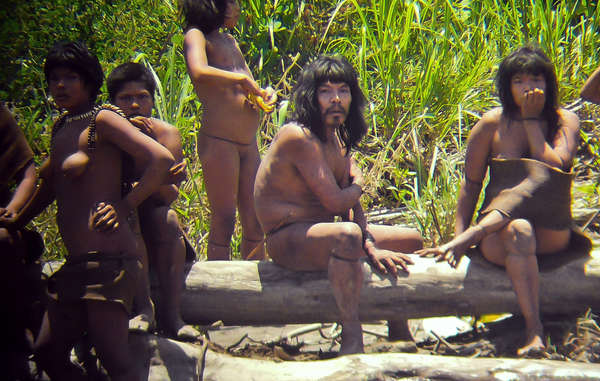
by Deep Green Resistance News Service | Apr 5, 2018 | Indigenous Autonomy
Featured image: The Mashco Piro have been increasingly entering into contact with outsiders. The new reserves are intended to ensure uncontacted groups’ lands remain undisturbed. © Jean-Paul Van Belle
by Survival International
Peru is to create two Amazonian reserves for the protection of uncontacted tribes , covering more than 2.5 million hectares. At least seven distinct groups of uncontacted tribes, including Matsés Indians, are known to be living in the areas comprising the new Yavari Tapiche and Yavari Mirin reserves in Peru’s NE Amazon state of Loreto.
The remote region has been under intense pressure from oil exploration, logging and a proposed road that could wreak devastation on the tribes. Those wishing to exploit the area’s natural resources have long denied the existence of tribes living in these forests, whose presence would obstruct their plans.
However, the Peruvian government has not ruled out further oil exploration and has taken over two oil concessions inside the new Yavari Tapiche and Yavari Mirin Reserves. Survival International, the global movement for tribal peoples, and the only organization fighting worldwide to stop the extermination of uncontacted tribes, has written to the government, along with thousands of supporters, calling for a total ban on all resource extraction in the reserves and for the two existing oil blocks to be canceled.
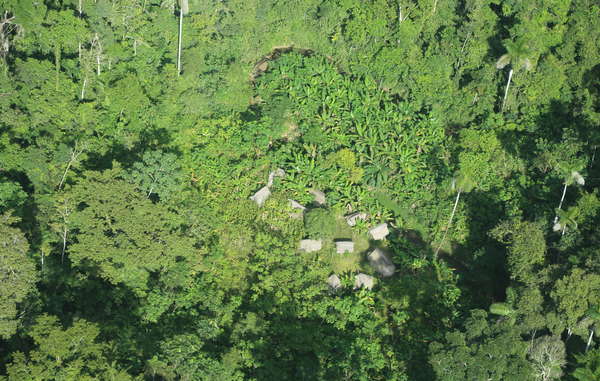
Communal houses of an uncontacted Indian community near the new Yavari-Tapiche reserve. © Melissa Medina/ IBC/ ORPIO
The reserves are crucial to the future survival of the uncontacted tribes, who face catastrophe unless their land is protected. Whole populations are being wiped out by violence from outsiders who steal their land and resources, and by diseases like the flu and measles to which they have no resistance. Entire groups can be rapidly decimated.
A Matsés man told Survival International: “Life before contact was incredible. Our uncontacted brothers still live in the forest. They live like we did before. Because the uncontacted people are out there, we want the government to protect the land.”
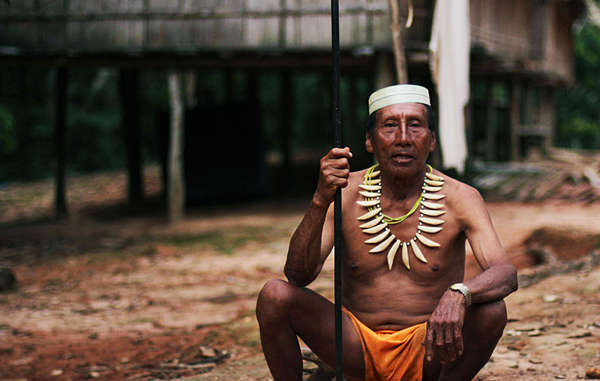
Since contact, the Matsés have suffered from diseases, especially malaria, that their plant-based medicines cannot cure. © Survival International
Survival International’s Director Stephen Corry said: “Though we welcome the creation of the Yavari Tapiche and Yavari Mirin Reserves, the Peruvian government’s refusal to ban all resource extraction is a serious concern. Uncontacted tribes are the most vulnerable peoples on the planet. They’re our contemporaries and a vitally important part of humankind’s diversity.”
The creation of the two new protected areas in Peru follows years of intense campaigning by indigenous peoplesand their supporters. However, three more proposed reserves are still awaiting formation. The longer the government delays the creation of protected areas, the greater the threat to the tribes who live there.
Background Information:
– Uncontacted tribes are tribal peoples who have no peaceful contact with anyone in the mainstream or dominant society. These could be entire peoples or smaller groups of already contacted tribes.
– Some may have been in touch with the colonist society in the past, and then retreated from the violence which that brought. Some may once have been part of larger tribal groups, and split off and moved away, fleeing contact.
– Uncontacted tribes are not backward and primitive relics of a remote past. They are contemporary societies and where their rights are respected, they continue to thrive.
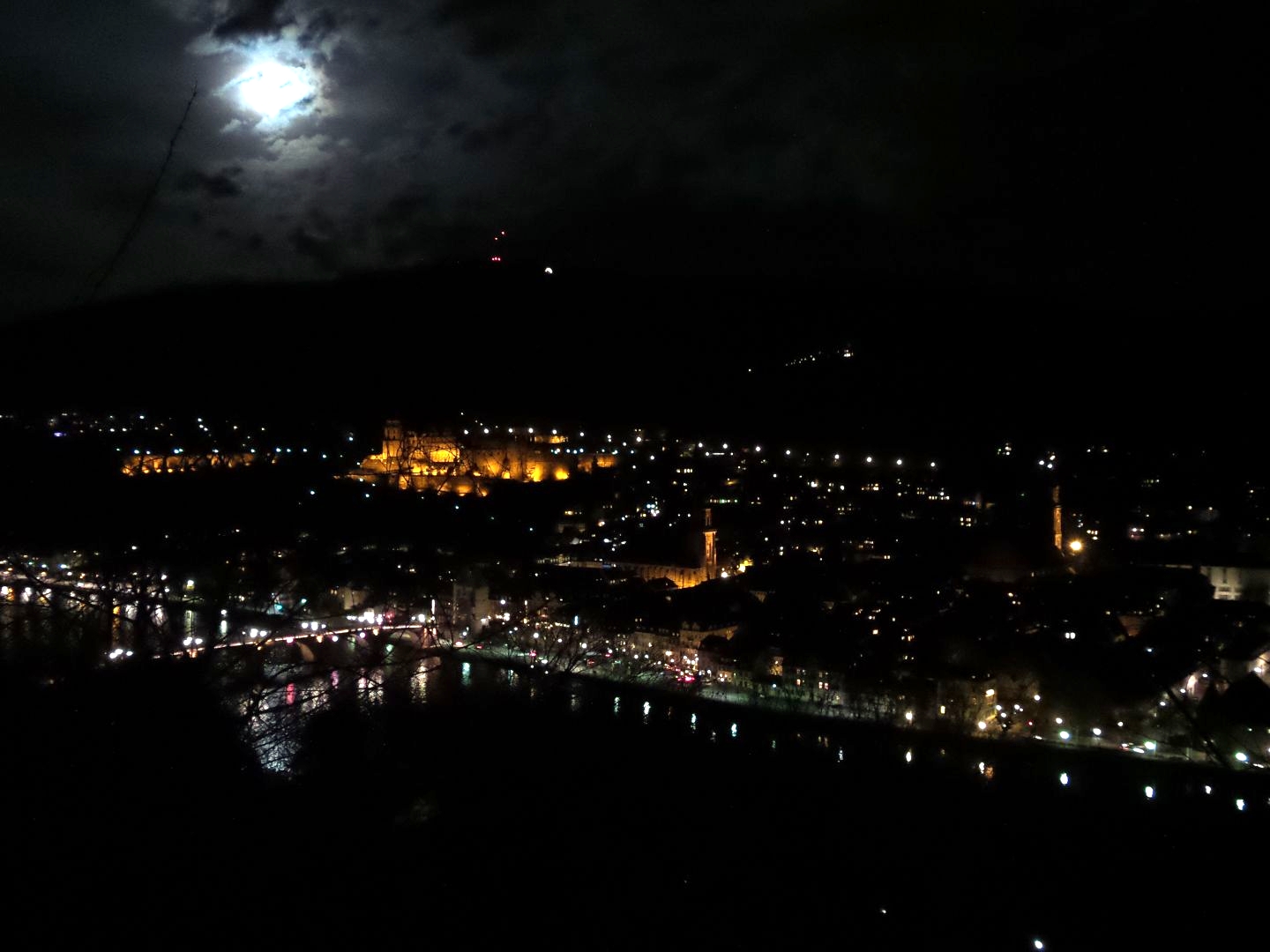
by Deep Green Resistance News Service | Apr 3, 2018 | Listening to the Land
by Boris Forkel / Deep Green Resistance Germany
Call me crazy, but I spent the last evening sitting in my garden and telling the first toad I met this year what I do and why. I told her about Deep Green Resistance, about the destruction of the natural world by our culture, and I asked her to tell me how she and her kind perceive all this.
I don’t know if I understood her correctly, but what I heard was: “Well, too many of us are dying. We know that some of you are trying to help us. That’s not enough. It has to stop.“
It doesn‘t matter if I‘m projecting or not. The toad is right.
She wasn’t shy, she sat quietly right next to me, moved a little bit every now and then and looked at me with beautiful red, serious eyes.

I do this regularly, I go to the wildest places that still exist here and listen to nature. I see different kinds of insects, wild bees, bumblebees, mosquitos, beetles, a few dragonflies. I see – mostly hear – birds, but I can only distinguish about five or six species. I love the call of the codger when it gets dark.
I know that the stag beetles come out of the ground at the beginning of June, where they have lived for three years as increasingly fattening grubs, to fly with a huge hum into the summer forest, where they will live exclusively from the sap of the rare old oaks their females prepare, since the males cannot bite the bark because of their huge antlers. Every June, I wait in my garden to welcome them. Towards the end of the summer they carry out their ecstatic fights and mating rituals, until after spending only three months as Europe‘s most giant beetles, they die and serve hungry birds as autumn delicacy.

I see squirrels, bats, toads, grass frogs and spotted salamanders. Sometimes I meet bigger animals: Wild boars, badgers, foxes, deer, but these are still scared of me and usually flee quickly.
The European bison, or wisent, that used to inhabit this forest, I only know from the zoo. But even the ones that are forced to live in captivity are gigantic, beautiful, trusting and kind. They look at me with loving eyes, each of them asking the same question:
Why?
Twice in my life I‘ve seen a snake. The first encounter was a European adder, many years ago in a village in the Odenwald (the forest where I live), when I was a school kid. The second one was a giant garter snake in my garden a few months ago. She (or he) was enjoying the sun, lying on a large oak tree that recently had been killed by a storm.
After this encounter, I wanted to learn more about them. I read that garter snakes used to be treated as house snakes and were considered holy animals that bring happiness and blessing. The garter snake was worshipped by numerous European peoples until the late Middle Ages, and appears in many myths. People fed garter snakes milk, just as the Indian villagers do in Rudyard Kipling’s Jungle Book with their holy village cobra.
Today, you are very lucky if you see a garter snake once in your life.
It’s getting dark. I look at the stars and the full moon. I speak to them and all the animals, plants and living beings that surround me. I tell them what I do and why, and I say prayers. I declare my loyalty. I tell them that I am one of them, and that I will do everything in my power to help them. They’re my relatives.
I’m asking them to tell me the most important things I can do for them. I tell them that I love them.
The toad is still sitting next to me. She (or he) looks at me, lets me take a foto and politely waits until I’m done talking to her. Then she slowly trots towards the pond I have build for her kind to inhabit.
Like thousands of times before, I walk the way from my garden to my small apartment in the city. Like thousands of times before, I look down over the Neckar River to see Babylon. I fear Babylon. I’m terrified of Babylon.
The Neckar River once was called Germany’s wildest river, but it has been raped for at least 2000 years, since the Roman invaders drained parts of it to build the old bridge that is still in place today. Nowadays, the River essentially serves as a road for the many freighters that are desperately trying to satisfy the insatiable hunger of Babylon. Like the Rhine, it had been full of salmon in the past, but this was so long ago that no human people can remember. I’m sure the trees still know.
During the last two years beavers return, after being absent for about 150 years. There are supposed to be about three thousand of them again in Baden-Württemberg. The state government is considering to kill about half of them because they are allegedly damaging trees.
The natural world is full of wisdom. So often I‘ve sat here or there, listening, speaking, praying. The river, the forest and all the creatures who still live here spreak different languages and have different messages. They have taught me a lot, and I have a lot more to learn. But in one thing they all agree:
It has to stop. Babylon Apocalypse.

by Deep Green Resistance News Service | Mar 28, 2018 | Culture of Resistance
Editor’s note: The following is from the chapter “Culture of Resistance” of the book Deep Green Resistance: A Strategy to Save the Planet. This book is now available for free online.
by Lierre Keith / Deep Green Resistance
Radical groups have their own particular pitfalls. The first is in dealing with hierarchy, both conceptually and practically. The rejection of authority is another hallmark of adolescence, and this knee-jerk reactivity filters into many political groups. All hierarchy is a tool of The Man, the patriarchy, the Nazis. This approach leads to an insistence on consensus at any cost and often a constant metadiscussion of group power dynamics. It also unleashes “critiques” of anyone who achieves public acclaim or leadership status. These critiques are usually nothing more than jealousy camouflaged by political righteousness. “Bourgeois” is a perennial favorite, as well as whatever flavor of “sell-out” matches the group’s criteria. It’s often accompanied by a hyperanalysis of the victim’s language use or personal lifestyle choices. There is a reason that the phrase “politically correct” was invented on the left.51
There’s a name for this trashing. As noted, Florynce Kennedy called it “horizontal hostility.”52 And if it feels like junior high school by another name, that’s because it is. It can reach a feeding frenzy of ugly gossip and character assassination. In more militant groups, it may take the form of paranoid accusations. In the worst instances of the groups that encourage macho posturing, it ends with men shooting each other. Ultimately, it’s caused by fighting horizontally rather than vertically.
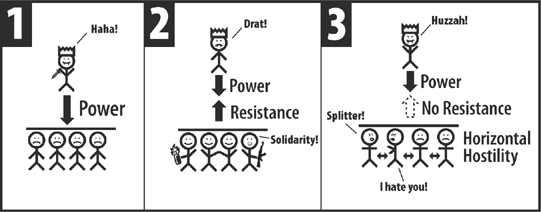
If the only thing we can change is ourselves or if the best tactics for social change are lifestyle choices, then, indeed, examining and critiquing the minutiae of people’s personal lives will be cast as righteous activity. And if you’re not going to fight the people in power, the only people left to fight are each other. Writes Denise Thompson,
Horizontal hostility can involve bullying into submission someone who is no more privileged in the hierarchy of male supremacist social relations than the bully herself. It can involve attempts to destroy the good reputation of someone who has no more access to the upper levels of power than the one who is spreading the scandal. It can involve holding someone responsible for one’s own oppression, even though she too is oppressed. It can involve envious demands that another woman stop using her own abilities, because the success of someone no better placed than you yourself “makes” you feel inadequate and worthless. Or it can involve attempts to silence criticism by attacking the one perceived to be doing the criticising. In general terms, it involves misperceptions of the source of domination, locating it with women who are not behaving oppressively.53
This behavior leaves friendships, activist circles, and movements in shreds. The people subject to attack are often traumatized until they permanently withdraw. The bystanders may find the culture so unpleasant and even abusive that they leave as well. And many of the worst aggressors burn out on their own adrenaline, to drop out of the movement and into mainstream lives. In military conflicts, more soldiers may be killed by “friendly fire” than the enemy, an apt parallel to how radical groups often self-destruct.
To be viable, a serious movement needs a supportive culture. It takes time to witness the same behaviors coalescing into the destructive patterns that repeat across radical movements, to name them, and to learn to stop them. Successful cultures of resistance are able to develop healthy norms of behavior and corresponding processes to handle conflict. But a youth culture by definition doesn’t have that cache of experience, and it never will.
A culture of resistance also needs the ability to think long-term. One study of student activists from the Berkeley Free Speech Movement interviewed participants five years after their sit-in. Many of them felt that the movement—and hence political action—was unsuccessful.54 Five years? Try five generations. Movements for serious social change take a long time. But a youth movement will be forever delinked from generations.
Contrast the (mostly white) ex-protestors’ attitude with the history of the Pullman porters, the black men who worked as sleeping car attendants on the railroad. The porters were both the generational and political link between slavery and the civil rights movement, accumulating income, self-respect, and the political experience they would need to wage the protracted struggle to end segregation. The very first Pullman porters were in fact formerly enslaved men. George Pullman hired them because they were people who, tragically, could act subserviently enough to make the white passengers happy. (When Pullman tried hiring black college kids from the North for summer jobs as porters, the results were often disastrous.) Yet the jobs offered two things in exchange for the subservience: economic stability (despite the gruesomely long hours) and a broadening outlook. Writes historian Larry Tye:
The importance of education was drilled into porters on the sleepers, where they got an up-close look at America’s elite that few black men were afforded, helping demystify the white race at the same time it made its advantages seem even more unfair and enticing. That was why they worked so hard for tips, took on second jobs at home, and bore the indignities of the race-conscious sleeping cars.… It was an accepted wisdom that they turned out more college graduates than anyone else. And those kids, whether or not they made lists of the most famous, grew up believing they could do anything. The result … was that Pullman porters helped give birth to the African-American professional classes.55
The porters knew that in their own lives they would only get so far. But their children were raised to carry the struggle forward. The list of black luminaries with Pullman porters in their families is impressive, from John O’Bryant (San Francisco’s first black mayor) to Florynce Kennedy to Justice Thurgood Marshall. Civil rights lawyer Elaine Jones, whose father worked as a porter to put his three kids through prestigious universities, has this to say: “All he expected in return was that we had a duty to succeed and give back. Dad said, ‘I’m doing this so they can change things.’ He won through us.”56
One reason the civil rights struggle was successful was that there was a strong linkage between the generations, an unbroken line of determination, character, and courage, that kept the movement pushing onward as it accumulated political wisdom.
The gift of youth is its idealism and courage. That courage may veer into the foolhardy due to the young brain’s inability to foresee consequences, but the courage of the young has been a prime force in social movements across history. For instance, Sylvia Pankhurst describes what happened when the suffragist Women’s Social and Political Union (WSPU) embraced arson as a tactic:
In July 1912, secret arson began to be organized under the direction of Christabel Pankhurst. When the policy was fully under way, certain officials of the Union were given, as their main work, the task of advising incendiaries, and arranging for the supply of such inflammable material, house-breaking tools, and other matters as they might require. A certain exceedingly feminine-looking young lady was strolling about London, meeting militants in all sorts of public and unexpected places to arrange for perilous expeditions. Women, most of them very young, toiled through the night across unfamiliar country, carrying heavy cases of petrol and paraffin. Sometimes they failed, sometimes succeeded in setting fire to an untenanted building—all the better if it were the residence of a notability—or a church, or other place of historic interest.57 (emphasis added)
Add to this that they performed these activities—including scaling buildings, climbing hedges, and running from the police—while wearing corsets and encumbered by pounds of skirting. It’s overwhelmingly the young who are willing and able to undertake these kinds of physical risks.
A great example of a working relationship between youth and elders is portrayed in the film Kanehsatake: 270 Years of Resistance.58 The movie documents the Oka crisis (mentioned in Chapter 6), in which Mohawk people protected their burial ground from being turned into a golf course. The conflict escalated as the defenders barricaded roads and the local police were replaced by the army. Alanis Obomsawin was behind the barricades, so her film is not a fictional replay, but actual footage of the events. Of note here is the number of times she captured the elders—with their fully functioning prefrontal cortexes—stepping between the youth and trouble, telling them to calm down and back away. Without the warriors, the blockade never would have happened; without the elders, it’s likely there would have been a massacre.
Youth’s moral fervor and intolerance of hypocrisy often results in either/or thinking and drawing too many lines in the sand, but serious movements need the steady supply of idealism that the young provide. The psychological task of middle age is to remember that idealism helps protect against the rough wear of disappointment. Adulthood also brings responsibilities that the young can’t always understand. Having children, for instance, will put serious constraints on activism. Aging parents who need care and support cannot be abandoned. And then there’s the activist’s own basic survival needs, the demands of shelter, food, health care. The older people need the young to bring idealism and courage to the movement.
The women’s suffrage movement started with a generation of women who asked nicely. In an age when women had no right to ask for anything, they did the best they could. The struggle, like that of the Pullman porters and the succeeding civil rights movement, was handed down to the next generation. Emmeline Pankhurst recalls a childhood of fund raisers to help newly freed blacks in the US, attending her first women’s suffrage meeting at age fourteen, and bedtime stories from Uncle Tom’s Cabin. She wrote,
Those men and women are fortunate who are born at a time when a great struggle for human freedom is in progress. It is an added good fortune to have parents who take a personal part in the great movements of their time.… Young as I was—I could not have been older than five years—I knew perfectly well the meaning of the words “slavery” and “emancipation.”59
Emmeline married Dr. Richard Pankhurst, who drafted the first women’s suffrage bill and the Married Women’s Property Act, which, when it passed in 1882, gave women control over their own wages and property. Up until then, women did not even own the clothes on their backs—men did. (The next time you buy your own shirt with your own money, remember to thank all Pankhursts great and small.) Emmeline and Richard’s daughters, Sylvia and Christabel, were the third generation of Pankhursts born to be activists. It was in large part the infusion of their youthful idealism and courage that fueled the battle for women’s suffrage. Emmeline wrote,
All their lives they had been interested in women’s suffrage. Christabel and Sylvia, as little girls, had cried to be taken to meetings. They had helped in our drawing-room meetings in every way that children can help. As they grew older we used to talk together about the suffrage, and I was sometimes rather frightened by their youthful confidence in the prospect, which they considered certain, of the success of the movement. One day Christabel startled me with the remark: “How long you women have been trying for the vote. For my part, I mean to get it.”
Was there, I reflected, any difference between trying for the vote and getting it? There is an old French proverb, “If youth could know; if age could do.” It occurred to me that if the older suffrage workers could in some way join hands with the young, unwearied, and resourceful suffragists, the movement might wake up to new life and new possibilities. After that I and my daughters together sought a way to bring about that union of young and old which would find new methods, blaze new trails.60
Emmeline raised her girls in a serious culture of resistance. As a strategist, she wisely understood that the moment was ripe for the young to push the movement on to new tactics. Thus was formed the WSPU. “We resolved to … be satisfied with nothing but action on our question. ‘Deeds, not Words’ was to be our permanent motto.”61 Those deeds would run to harassing government officials, civil disobedience, hunger strikes, and arson. They would also be successful.
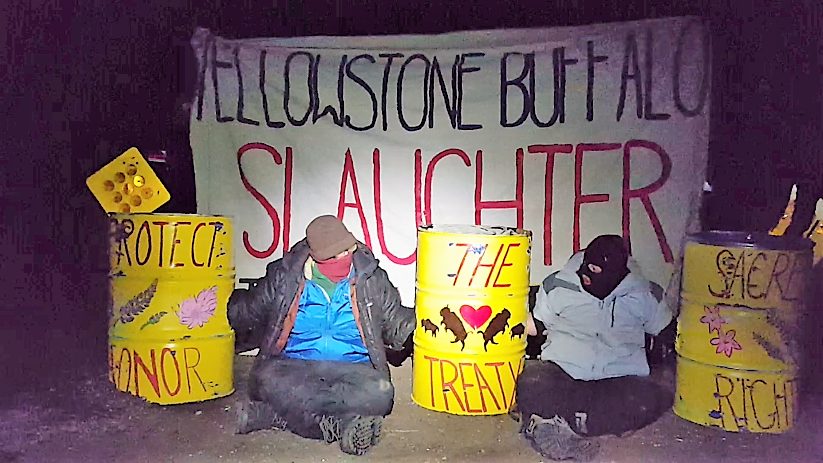
by DGR News Service | Mar 16, 2018 | Indigenous Autonomy, Obstruction & Occupation
March 16th 2018
For Immediate Release
Media Contact: Talon Brings Buffalo
406-404-9131
Stephens Creek Trap, Yellowstone National Park
March 16th 2018
Hours before dawn on Friday March 16th, two members of the Wild Buffalo Defense collective arrived at the gate of Yellowstone National Park’s Stephens Creek Buffalo capture facility. They blocked the gate with three 55 gallon drums filled with concrete, locking their arms inside the barrels. The three 1000 pound drums blocked access to the facility, preventing livestock trucks from taking the wild buffalo to slaughter. This action came in the wake of a similar event last week at the Stephens Creek Trap, where two buffalo protectors locked themselves to the hydraulic squeeze shoot using a metal pipe.
Wolf, the first individual locking down, described why he was taking the action: “My father is from Michaocan, Mexico, so I have both native and colonizer blood. Since I wasn’t raised in a native setting, this is my way to give back to the native community. I’m from Illinois — it’s called the Prairie State, and there’s less than one one-hundredth of the prairie left. It’s all strip malls and corn fields…I don’t like seeing just concrete and steel. Seeing how peaceful the buffalo are and how strong they are, they go through enough hardship in their lives in the forest and the plains and then with what Yellowstone National Park is doing to them they still carry on. They inspire me to keep going.”
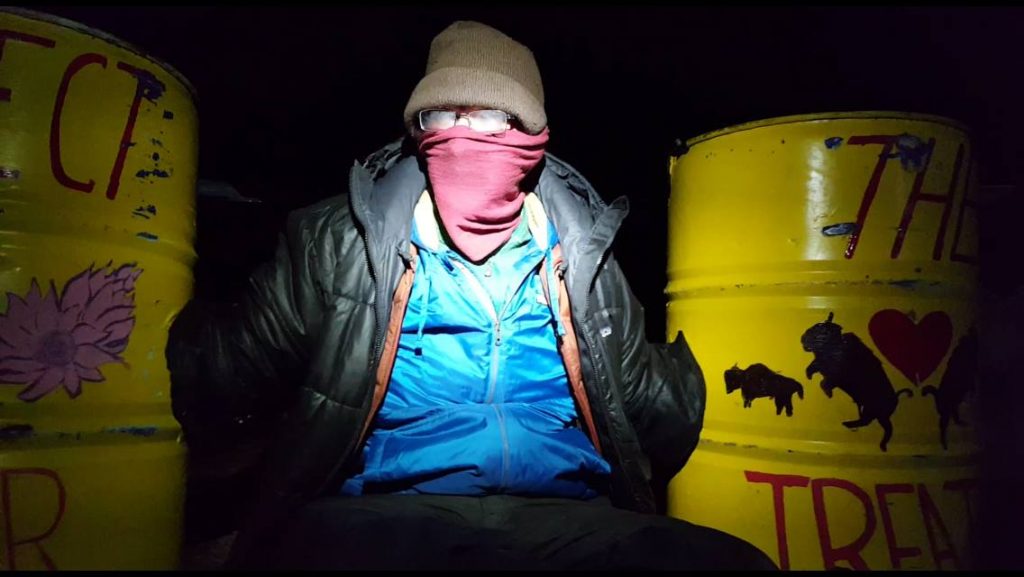
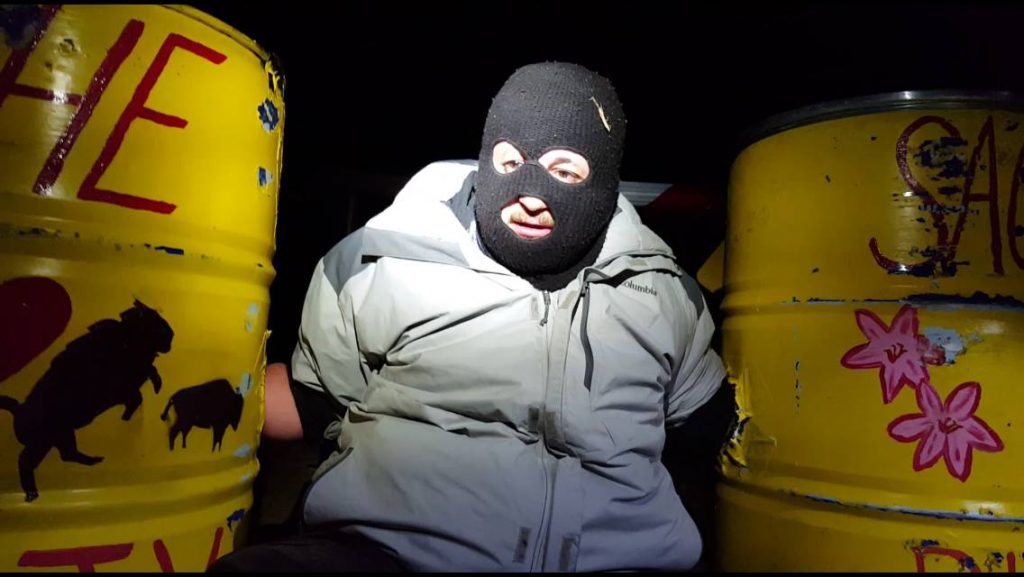
Coyote, the other individual blocking the gate, said: “I’m doing this to get a better understanding of what is really going on and to protect the buffalo and the lands that they roam. I feel like I have been lost inside…but now that I’m here I feel more combined with myself, with others, and with knowledge and understanding. Whenever I’m with the buffalo I feel like my heart runs with them. When I’m with them they already know the questions, they already know the answers, and I don’t have to respond because they already know. I think it’s a good thing for people to learn. There’s not a day in this world where you’re not able to learn something. What we’re doing is something we love to do and we only live once so we should do what we love to do and if anybody wants to come out and join and learn this experience then they should.”
The barrels were painted with two phrases, “Protect the Sacred” and “Honor the Treaties.” The words highlight the fact that Buffalo are sacred creatures to the Plains Indians. Blackfeet and Lakota prophecies say that when the wild buffalo return, the people and the earth will be healed. Yellowstone National Park currently captures and slaughters about 25% of the herd every year. If this mismanagement of the population continues, these prophecies will… [press release ends].













